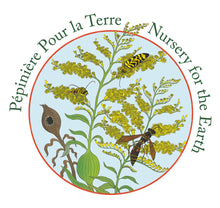About us

Background
Hi, my name is Henry Robertson. I am an economist and statistician by training but a botanist and horticulturalist by passion. It is with great hope and joy that I launched Nursery for the Earth in Summer of 2022.
I have been passionate about nature since a very young age, I always loved finding and examining insects and other "bugs" and reading and the interconnectedness of bugs and plants and of all living and non-living things.
Getting into plants
While this interest in nature was always present a number of years ago it spiked with plants. Specifically, it was realizing that all the "Sugar maples" that I thought were around my house were actually invasive Norway maples, and that most of the plants I encountered in yards and even semi-wild areas were actually non-native species, that even many of the invertebrates we encounter on a daily basis such as grove snails, earwigs, potato bugs and more are all introduced species and that much of our native flora and fauna are under threat.
However, the Norway maples and exotic grasses were not all that there was around my yard, there was also a Butternut and an American elm, both majestic native trees that have been greatly reduced by invasive fungi. Further, beyond just living in my yard, they were propagating themselves and I made an effort to gather the doomed seedlings that were growing in places they couldn't live long term, and began giving them to friends, neighbours and the community. Thus I first started dipping my toes into what would become Nursery for the Earth. I then started gathering other seeds of native plants I encountered on various hikes and began growing these and propagating as well. In the coming years I was amazed at how the nature around my house changed, my garden felt more alive than it had ever been with cultivated varieties dahlias and petunias.
Volunteering
Inspired, I made it mission to be learn to identify and try to understand each and every plant species in my area. I joined the local Naturalists club and volunteered to various local conservation efforts. Through this I eventually learned enough to lead various botany tours and and became interested in restoration. While there were many great sources for native plants, in most cases these were not plants sourced from my region, instead often coming from the United States or very southern Ontario. Further, there were also many species plants that no one seemed to sell, plants like Poverty oat grass and Lindley aster.
The nursery
In May of 2021, my spouse and I found a mostly abandoned farm and cabin for sale in nearby in Bristol Quebec. I was amazed at the richness of biodiversity that had re-established since the lands were pasture in the 1950s. We knew, this was the place to launch the nursery and in September of that year it became a reality. Our plans were slowed somewhat as we found out we were expecting our daughter, but those are the challenges and joys that life provides.
Our farm in Bristol (technically Wyman) is a roughly 100 acre property that includes a number of habitats such as red maple forests, dry sandy meadows, granite barrens, a stream with a surrounding wet meadow, and about 20 acres of old growth hemlock forest that has never been tilled. We are committed to documenting and minimally altering this ecosystem, including leaving the entirety of the remaining old growth untouched while also enhancing other areas through the removal and replacement of invasive species and other management such as through recreation of vernal ponds and mounds for wildlife use in areas that had been plowed flat.
The land
Further, we celebrate the history of this land through on-going partnerships with Indigenous organizations and individuals. to facilitate traditional and cultural activities on the property. We also have plans to work with archeological groups to document the settler history of this site. Notably, there is a still standing pioneer homestead, made of ancient squared hemlock logs that we hope to restore one day.

The ethos of Nursery for the Earth is to achieve profit through preservation, to passionately celebrate this land as much we can by sharing it, through our horticultural plants, our nature tours and other products and services.
Thank you for taking the time to read our story :)
Henry Robertson - Nursery for the Earth
